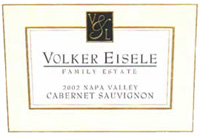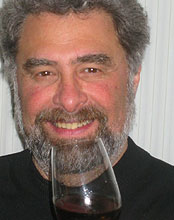

Volker Eisele Family Estate
2002 Cabernet Sauvignon(Chiles Valley ~ Napa Valley)
Year in, year out, Volker Eisele’s Cabernets are some of the most Bordeaux-styled wines coming out of the Napa Valley. By that, I implicitly mean that they are substantial wines, full of character and complexity, and are relatively lower in alcohol than most Cabs coming out of the region. This one is a listed and very manageable 14.1 percent that would fare well in France, too.
This 2002, blended with 5 percent Cab Franc and an equal proportion of Merlot from the estate’s organic vineyard (some of which date to 1975), possesses perfect balance. Like Eisele’s other wines, it’s earthy and intellectual – meaning that is gives one something to think about. I’d hold onto it for a couple of years because the tannins still need some sorting out, and then you’ll be into it for the long haul, perhaps as much as 20 years.
The blend spent 22 months in 50- to 60-percent new French barrels and only 2,300 cases were produced. One more thing, the $38 price is a steal, especially when one considers that the average bottle of Cabernet originating from the Napa Valley is at about $50. What’s more, it’s worth more than that.
Much of the reason I’ll conjecture is that the wine was produced in Chiles Valley, an American Viticulture Area (AVA) that doesn’t boast the cachet as do some of the region’s other more glamorous appellations. More’s the pity, which means more for you and me. So, take advantage of this under-appreciated AVA and this under-valued wine.
Reviewed June 12, 2006 by Alan Goldfarb.
Other reviewed wines from Volker Eisele Family Estate
|
Volker Eisele Family Estate 2004 Cabernet Sauvignon (Chiles Valley ~ Napa Valley)Alan Goldfarb 12/7/2007 |
|
Volker Eisele Family Estate 2003 Cabernet Sauvignon (Chiles Valley ~ Napa Valley)Catherine Fallis 2/6/2007 |
The Wine
Winery: Volker Eisele Family Estate |
The Reviewer Alan Goldfarb
Alan Goldfarb
Alan Goldfarb has been writing about and reviewing wine for 17 years. His reviews have been published in the St. Helena Star, San Jose Mercury, San Francisco Examiner, Decanter, and Wine Enthusiast, among others. Not once has he used a point system, star system, or an iconic symbol to quantify a wine. What counts in Mr. Goldfarb’s criteria when judging a wine is: how it tastes in the glass; is it well-constructed; its food compatibility; and presence of redeeming regional attributes. |












